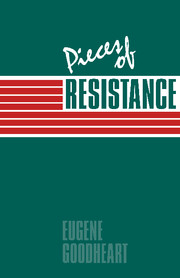Book contents
- Frontmatter
- Contents
- Preface
- Acknowledgments
- Autobiographical
- Part I Critics and criticism
- 1 William Chace's Lionel Trilling: Criticism and Politics
- 2 Philip Rahv and Image and Idea
- 3 Joseph Frank's Dostoevsky: The Seeds of Revolt 1821–1849
- 4 Leslie Fiedler and the mythic life
- 5 The “radicalism” of Susan Sontag
- 6 Paul Goodman's neolithic conservatism
- 7 Geoffrey Hartman's Criticism in the Wilderness: The Study of Literature Today
- Part II Contemporary culture in conflict
- Part III Writing in America and elsewhere
4 - Leslie Fiedler and the mythic life
Published online by Cambridge University Press: 05 August 2012
- Frontmatter
- Contents
- Preface
- Acknowledgments
- Autobiographical
- Part I Critics and criticism
- 1 William Chace's Lionel Trilling: Criticism and Politics
- 2 Philip Rahv and Image and Idea
- 3 Joseph Frank's Dostoevsky: The Seeds of Revolt 1821–1849
- 4 Leslie Fiedler and the mythic life
- 5 The “radicalism” of Susan Sontag
- 6 Paul Goodman's neolithic conservatism
- 7 Geoffrey Hartman's Criticism in the Wilderness: The Study of Literature Today
- Part II Contemporary culture in conflict
- Part III Writing in America and elsewhere
Summary
No! In Thunder (1960), the second collection of Leslie Fiedler's essays, is bound to add to the fame and notoriety that have attended Fiedler ever since he began to publish. In particular, the Foreword and the introductory essay, from which the book takes its title, will confirm Fiedler's reputation for being toughminded, arrogant and iconoclastic. Appropriately, he begins his Foreword with an expression of hope that his essays will have the intended effect of “offending all those with cemeteries to defend,” whether they be the pieties of “the avant-garde revolt in the twenties, Marxism of the thirties, the enlightened middlebrowism of the forties or the hip pieties of the fifties.” Fiedler has already established a reputation for himself as toughminded and unsentimental in An End to Innocence, and more recently in Love and Death in the American Novel. He obviously wants to make it clear that, if anything, he has hardened in the interim between An End to Innocence and the current collection of essays. The Foreword is a piece of unabashed self-revelation. Fiedler speaks of himself as a legend from which he hopes to disentangle his real self, and though he repudiates as part of the legend reports of friend being separated from friend, lover from lover by arguments over one or another of his essays, one can nonetheless detect an unmistakable note of pride. “At least, my essays have brought certain dull parties to a long overdue end.”
- Type
- Chapter
- Information
- Pieces of Resistance , pp. 37 - 45Publisher: Cambridge University PressPrint publication year: 1987



